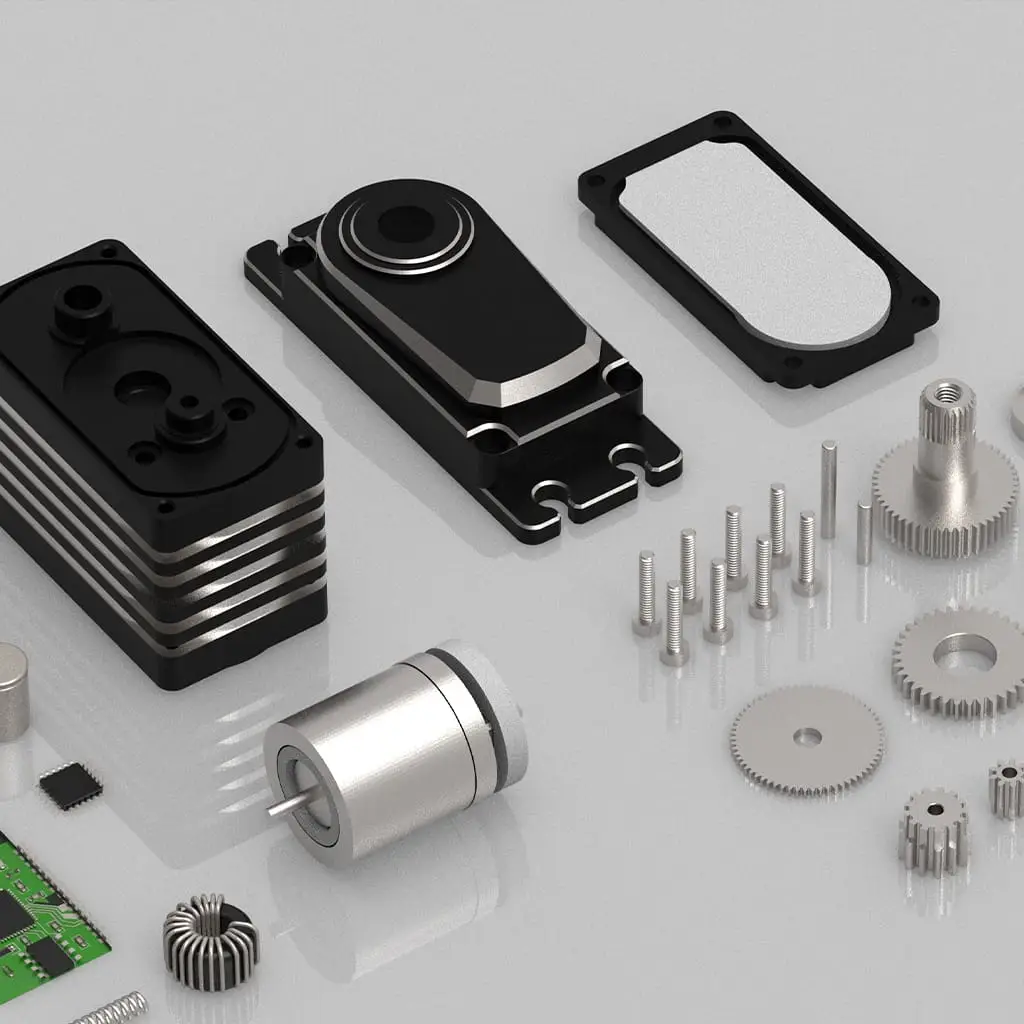Metal and plastic gear servos each have their advantages and disadvantages, making universal conclusions difficult based solely on material properties. This article will analyze optimal gear material selection strategies for different scenarios based on actual application needs, using specific cases from GXServo’s extensive product line to help users make scientific decisions.
1. Systematic Analysis of Selection Dimensions
Servo gear material selection should comprehensively consider the following dimensions:
- Mechanical Load Characteristics
Including peak torque, continuous torque, impact frequency, etc. GXServo’s technical documentation provides detailed load spectrum analysis guidelines. - Environmental Conditions
Temperature range, humidity, corrosive substances, dust, and other external factors. GXServo’s different product series have specialized designs for various environments. - Operational Dynamic Requirements
Speed, precision, repeatability, and other performance indicators. GXServo’s high-precision series uses special gear processing techniques. - Economic Considerations
Initial cost, maintenance cost, total lifecycle cost, etc. GXServo provides cost calculation tools for comprehensive evaluation. - Ancillary Factors
Weight limits, noise requirements, maintenance convenience, etc. GXServo’s product catalog clearly marks these parameters.
2. Material Selection Recommendations for Typical Applications
- Competition-Grade Remote-Controlled Models
High dynamic loads and frequent impacts favor GXServo metal gear series like MG-996R. Even weight-sensitive competition applications should prioritize reliability. - Educational Robotics Platforms
Moderate loads and cost sensitivity make GXServo plastic gear economy models like SG-90 fully adequate. Gear repair kits can address potential damage. - Light Industrial Robotic Arms
Long-term continuous operation with moderate loads benefits from GXServo hybrid gear series like HG-5020, balancing metal gears’ lifespan with plastic gears’ cost control. - Security Camera Gimbals
Outdoor environments with large temperature variations but light loads suit GXServo all-metal sealed series like MI-3580, offering corrosion resistance and temperature stability. - Micro Drone Control Surfaces
Extreme weight sensitivity and very light loads call for GXServo ultra-micro plastic gear series like SP-05A, weighing only about 5g. - High-Precision Astronomical Instruments
Ultra-high precision requirements with light loads but no backlash tolerance need GXServo zero-clearance metal gear series like MP-750, using special ground gears for precise positioning. - Underwater Robot Joints
High waterproof requirements with moderate loads suit GXServo waterproof hybrid series like HW-3040, with plastic output gears reducing sealing difficulty and metal transmission gears ensuring strength.
3. GXServo Product Line Coverage Strategy
GXServo meets diverse scenario needs through segmented product lines:
- ProMetal Series
All-metal gears for extreme loads and professional applications like industrial automation and advanced competitions. - EcoPlastic Series
Cost-effective plastic gears for entry-level and educational markets, emphasizing value. - HybridPerformance Series
Metal-plastic hybrid designs for the mid-range market seeking balance, covering the widest application range. - Specialty Series
For special environments including waterproof, dustproof, and wide-temperature variants meeting unique needs.
4. Decision Process and Pitfall Avoidance
Scientific selection should follow this process:
- Define Application Requirements
List all key parameters and requirements, distinguishing “must-have” from “nice-to-have” standards. - Preliminary Model Screening
Use GXServo selection tools to narrow options based on core parameters. - Detailed Comparative Analysis
Deep parameter comparison of shortlisted models, especially temperature ranges and lifespan curves. - Cost-Benefit Evaluation
Calculate total ownership cost, not just purchase price. GXServo’s website provides online calculators. - Verification and Testing
If possible, conduct real-world condition tests or reference similar application cases.
Common selection mistakes include:
- Over-pursuing metal gears’ “premium” image while ignoring actual needs
- Comparing only rated torque while neglecting dynamic load capacity
- Ignoring environmental impacts on material performance
- Considering only purchase cost while overlooking maintenance and replacement costs
5. GXServo Technical Support System
GXServo provides comprehensive selection support:
- Online Selection Tools
Interactive Q&A guides users to clarify needs and recommends suitable models. - Application Case Library
Hundreds of real application case references covering typical needs across industries. - Engineering Consulting
Professional team offers one-on-one selection advice, especially for special applications. - Sample Testing Program
Allows limited functional verification before purchase. - Custom Solutions
When standard products don’t suffice, offers targeted modifications or new designs.
6. Future Development Trends
Servo gear technology is evolving in these directions:
- New Composite Materials
Carbon fiber reinforcement, graphene modification and other new materials may break traditional metal/plastic dichotomies. - Smart Material Applications
Innovations like shape-memory alloys and self-healing plastics will enhance gear performance. - Hybrid Design Optimization
Big data and AI simulations will create more scientific hybrid ratios. - Manufacturing Process Innovations
3D printing and other new methods will achieve gear geometries impossible with traditional processes.
7. Conclusion
Metal and plastic gear servos don’t represent simple superiority or inferiority but rather different optimal application scenarios. GXServo’s complete product line provides precise solutions for various applications. Scientific selection should start from actual needs, comprehensively considering load, environment, economy and other dimensions rather than simply pursuing “premium” configurations. As material technology and design methods advance, gear material performance boundaries will continue expanding, but the selection principle of “the right solution for the specific need” will always apply. With GXServo’s comprehensive technical support, users can find the best gear material solution for their specific applications.

